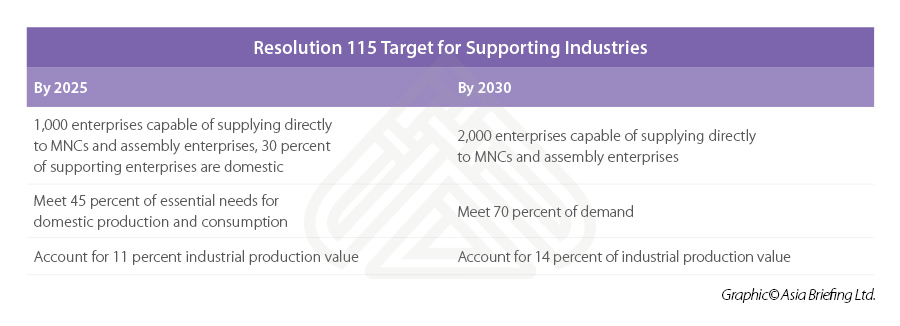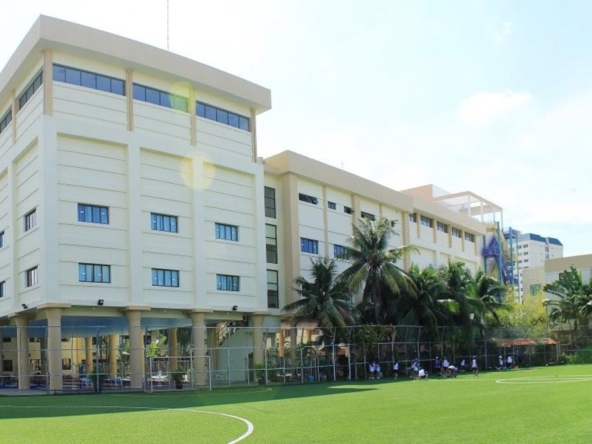Vietnam approved Resolution 115 to promote the development of supporting industries and help increase their participation in global value chains

- Vietnam approved Resolution 115/NQ-CP on August 6, to promote the development of supporting industries for the period 2020-2030.
- The resolution emphasizes the need to improve supporting industries to welcome new avenues of investment capital and production relocation to Vietnam.
- The resolution also sets out targets for Vietnamese supporting sectors to be more competitive in providing supporting industrial products for manufacturing sectors.
The Vietnamese government approved Resolution 115/NQ-CP (Resolution 115) on August 6, 2020, to promote supporting industries in Vietnam. The approved resolution maps out a comprehensive approach to improve both administrative policies and enhance private sectors’ capabilities through training and financial incentives. Supporting industries that are listed in the prioritized list prescribed in the Law on Investment and Decree 111/2015/NĐ-CP are the focus of this resolution.
To understand the implications of this resolution to manufacturing industries and the business environment in Vietnam, Vietnam Briefing will discuss the highlights of Resolution 115.
Set targets for supporting industries
Resolution 115 sets out targets for Vietnamese enterprises that are able to produce highly competitive supporting industrial products in the next decade, in particular:

These targets imply the government’s proactive approach to addressing the rising demand for supporting industries. This is a result of Vietnam’s industrialization and further participation in the global supply and value chain.
Synchronizing and completing policy mechanisms to facilitate supporting industries
As prescribed in the Law on Investment and Decree 111/2015/NĐ-CP, the following supporting industrial products are prioritized in the future policy framework, particularly:
- Mechanical engineering industry: industrial products supporting high-tech industries (high precision molds, standardized mechanical details, microelectronic circuits), components and spare parts for equipment using renewable energies, new generation motors, etc;
- Textile and garment industry: natural fibers, synthetic fibers, technical fabrics, chemicals, auxiliaries and dyes for fabrics dyeing, etc.;
- Leather and footwear industry: leather and leatherette, chemical tanning, shoe sewing thread, shoe accessories, etc;
- Electronics industry: basic electronics – photoelectronic components, components of quartz, materials for electronic component production (semiconductors, magnetic materials, etc.), electronic circuits, batteries, etc; and
- Automobile industry: electrical components, engine and engine details, lubrication systems, cooling system, fuel supply system, power transmission system, etc.
The government is also working on synchronizing different mechanisms across upstream and downstream industrial activities.
For example, the resolution stresses on coordinating policies between material industries and processing and manufacturing sectors, so that the upstream sector can be more responsive to downstream sectors’ demands. This helps create a more self-sufficient industrial foundation for the domestic market, reducing its dependence on imported materials.
Further, local governments are encouraged to step in to invest resources, implement policies, program initiatives to promote the expansion and upgrade prioritized supporting sectors, as per local conditions and demands.
Financial incentives for supporting industries
To support the modernization of supporting industries, the government will provide financial incentives in forms of favorable interest rates and more short-term loan availability.
The government will also grant interest rate difference compensation for medium and long-term loans for businesses in the listed prioritized industries. These industries will also be considered for loans financed by central, local budgets, official development aid (ODA), and other foreign concessional loans.
Developing the domestic value chain
The government has pledged to facilitate and develop the value chain by promoting business connections, especially between Vietnamese supporting enterprises and multinational manufacturing companies.
The resolution sets a plan to build more industrial clusters and zones, support the training of workers and management capacities to improve the level of domestic value-add.
To reap opportunities from Vietnam’s multiple free trade agreements (FTAs), the Ministry of Industry and Trade (MoIT) will introduce and enforce a system of technical standards for respective industries. This measure will strengthen quality inspection for industrial goods in accordance with international commitments and practices.
Meanwhile, the authority will also work on dismantling trade barriers, anti-monopoly behaviors, and other unhealthy competition to improve the level playing field for the domestic market.
Digitalizing support industries management
Following the successful launch of a digital database for supporting industries in June 2020, the government will focus more on constructing and operating technical centers to support regional and local industrial development in innovation, research and development (R&D), and technology transfer activities.
In a similar effort to improve scientific and technological capacity, the government has set priorities to promote the commercialization of scientific and technological research products, build and popularize statistical systems, and industrial databases for effective communication and cooperation between domestic supporting sectors and foreign manufacturing firms.
Key takeaways
Vietnam’s supporting industries are increasingly developing and play an essential role in Vietnam’s participation in the global supply and value chains. The sector’s development also helps the economy grow in a more sustainable manner, avoid the middle-income trap, and attract quality foreign investment with positive technological spillovers.
Promoting supporting industries is, therefore, one of the top priorities of Vietnam. Yet, past government efforts to support the sector such as Decree No.111/2015/NĐ-CP still show the limited outcomes as supporting industries are still unable to meet rising demand and international standards.
Resolution 115 is expected to remove difficulties and entanglements on policy mechanisms and create favorable conditions for supporting industries to be more competitive and capable of participating in the global value chain.







